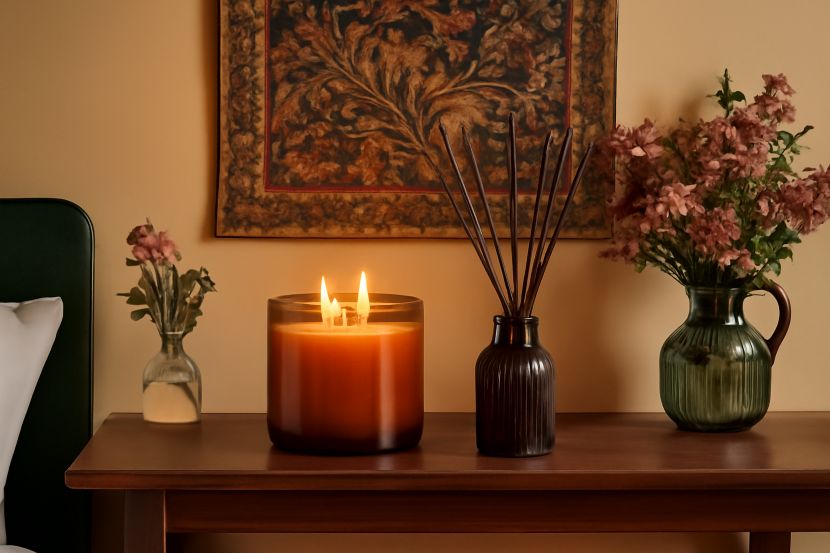Published on
October 27, 2025
With the more chilly months on the way, numerous UK higher-end hotels have started using seasonal fragrances to turn their guest warm up their rooms. These fragrances do more than just warm the room; they create an environment that makes an ordinary visit extraordinary, standing out with their uniqueness. These clients include clients from notable such as Edinburgh, London, or the Lake District, who all claim that these autumn fragrances ensure the clients receive a warm and soothing restful environment.
Autumn Scents in Luxury Hotels: A Tourism Trend
As tourism in the UK continues to thrive, luxury hotels are constantly seeking innovative ways to enhance the guest experience. The use of autumn scents has become one of the latest trends, as many high-end establishments aim to create an immersive, luxurious ambiance. This shift from the crisp, citrusy fragrances of summer to the deep, earthy scents of autumn plays a significant role in shaping a guest’s emotional connection to the space.
The fragrances chosen for hotel rooms are not just about smell they are designed to create an atmosphere that resonates with the seasons and comforts guests. This growing trend highlights how top hotels are integrating sensory experiences into their branding, providing not just a place to stay, but a unique sensory journey that guests are sure to remember.
Five Popular Fall Scents Enhancing the UK Tourism Experience
- Amber: Amber is one of the most popular scents used by high-end hotels during the autumn months. Known for its warm, slightly spicy, and subtly sweet fragrance, amber creates an inviting atmosphere that appeals to the senses. It adds a touch of sophistication to guest rooms, making them feel more like a sanctuary. Hotels in cities like London and Bath have reported an increase in guest satisfaction when incorporating amber into their room fragrances.
- Jasmine: Known for its subtle floral notes, jasmine is another fragrance commonly used in luxurious UK hotels. It offers a timeless appeal and provides guests with a calm, intimate environment. The gentle scent of jasmine, which resembles fresh linens, is perfect for those looking to unwind after a day of sightseeing in the UK’s scenic towns or bustling city centres.
- Vanilla: Vanilla is often associated with nostalgia, but in luxury hotels, it’s paired with other fragrances to create a more sophisticated scent profile. By combining vanilla with unexpected notes like sandalwood or musk, hotels in destinations like Oxford and the Cotswolds are giving their rooms a sweet yet calming vibe that invites relaxation. This scent is perfect for guests looking for comfort and a sense of familiarity during their stay.
- Sea Salt: For a fresh, coastal feel, many luxury hotels, especially in seaside destinations like Cornwall and Brighton, use sea salt fragrances to evoke the freshness of the ocean. These scents often include hints of mineral air and bring clarity and openness to the room, even during the colder months. Sea salt fragrances are particularly popular in coastal retreats, where they complement the surrounding natural beauty.
- Wood: Deep woody fragrances are a classic autumn scent, commonly used in hotels located in nature-rich regions like the Lake District or Scottish Highlands. These scents bring the outdoors into the guest room, evoking the grounded, earthy presence of trees and forests. Hotels incorporating woody scents are offering a refreshing and rejuvenating atmosphere, allowing guests to feel more connected to nature during their stay.
Enhancing the UK’s Tourism Industry with Scent
The importance of scent in the hospitality industry is becoming increasingly recognised, particularly in the luxury sector. According to UK tourism reports, hotels that invest in creating a unique sensory experience for their guests are more likely to receive positive reviews and repeat bookings. As tourists seek more immersive experiences, the role of fragrance in creating an unforgettable atmosphere cannot be understated.
In destinations like London, Edinburgh, and the Lake District, tourists are drawn not only by the beauty and history of these places but also by the sense of comfort and luxury provided by their hotel experiences. The strategic use of scents helps establish a clear identity for these hotels, distinguishing them from others in the competitive tourism market.
Moreover, as guests seek more sustainable and mindful travel experiences, the trend towards calming, natural scents align with broader wellness tourism movements. The addition of scents like amber, vanilla, and wood complements the rise of eco-conscious travel, where people are more inclined to choose accommodations that offer both comfort and sustainability.
The Future of Tourism and Scent in Luxury Hotels
Luxury hotels in the UK have begun using sensory marketing has begun to improve marketing in hospitality to allow for improved guest experiences at luxury hotels that benefit from the huge tourism industry in the UK throughout the winter and autumn periods. The hospitality industry, and especially luxury hotels, along with modern tourist demands and autumnal seasonal marketing themes, including but not limited to the, shift to amber, jasmine, and wood. When Smooth, sweet, savory and/or salty fragrances harmoniously blend into the moody atmosphere of a quintessential cold London day, it becomes a bracing day, infused with cozy calm, skin alive with the scrub of winter, and breezing over branches and roof.
This new trend will help shape future tourism opportunities of the UK, enabling marketing opportunities for new and unique experiences beyond what has been deemed the sight and skin.


